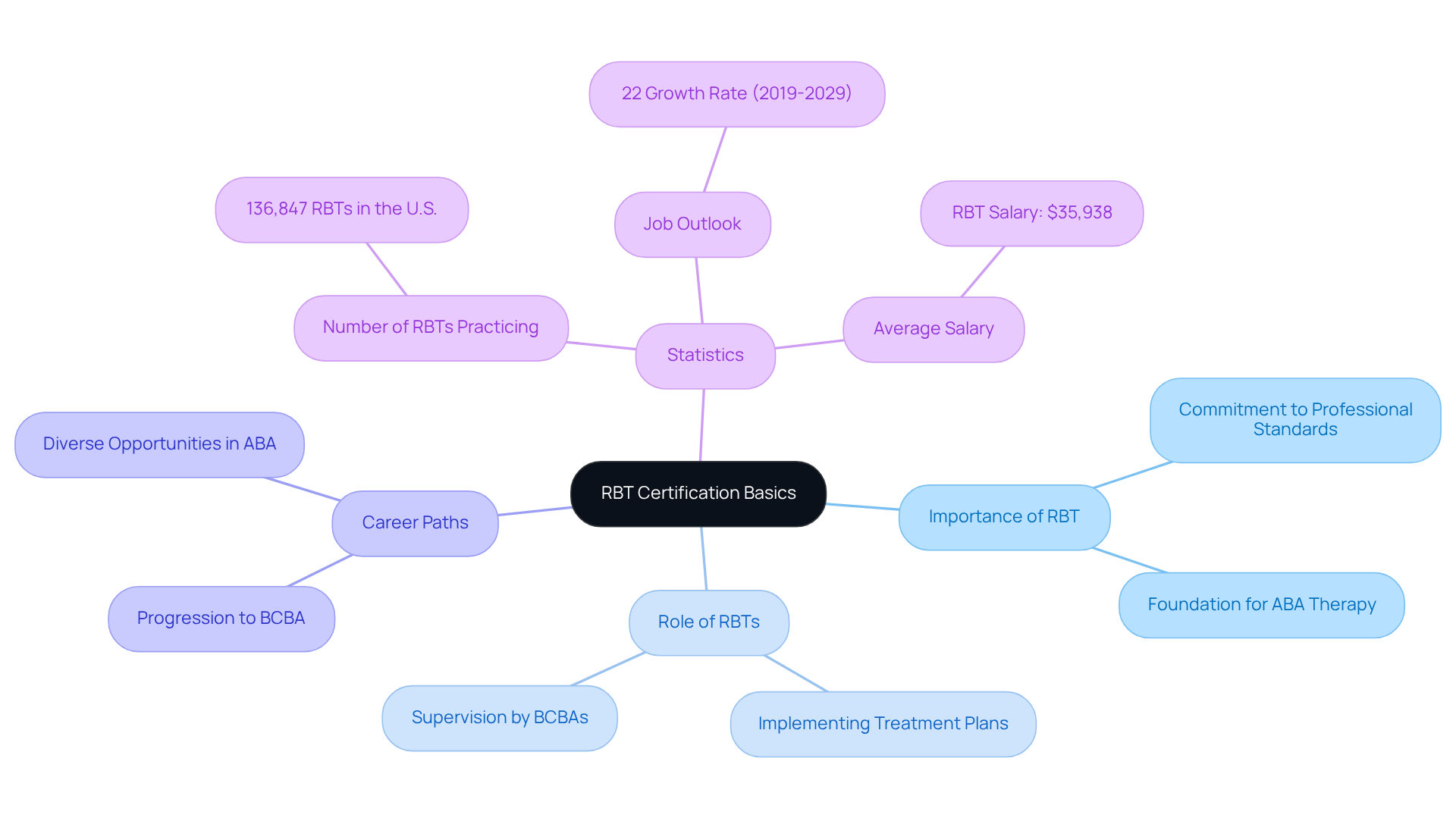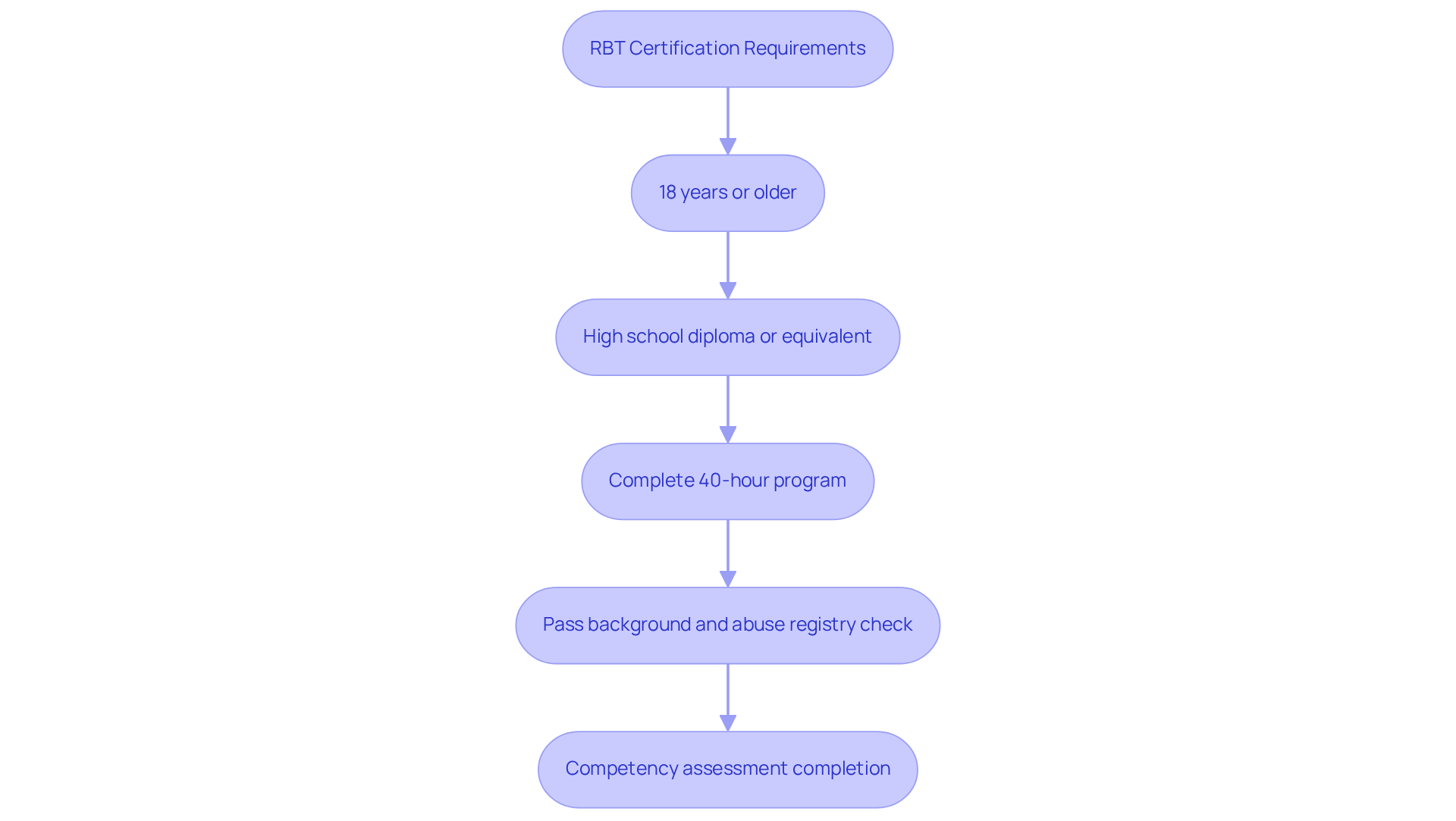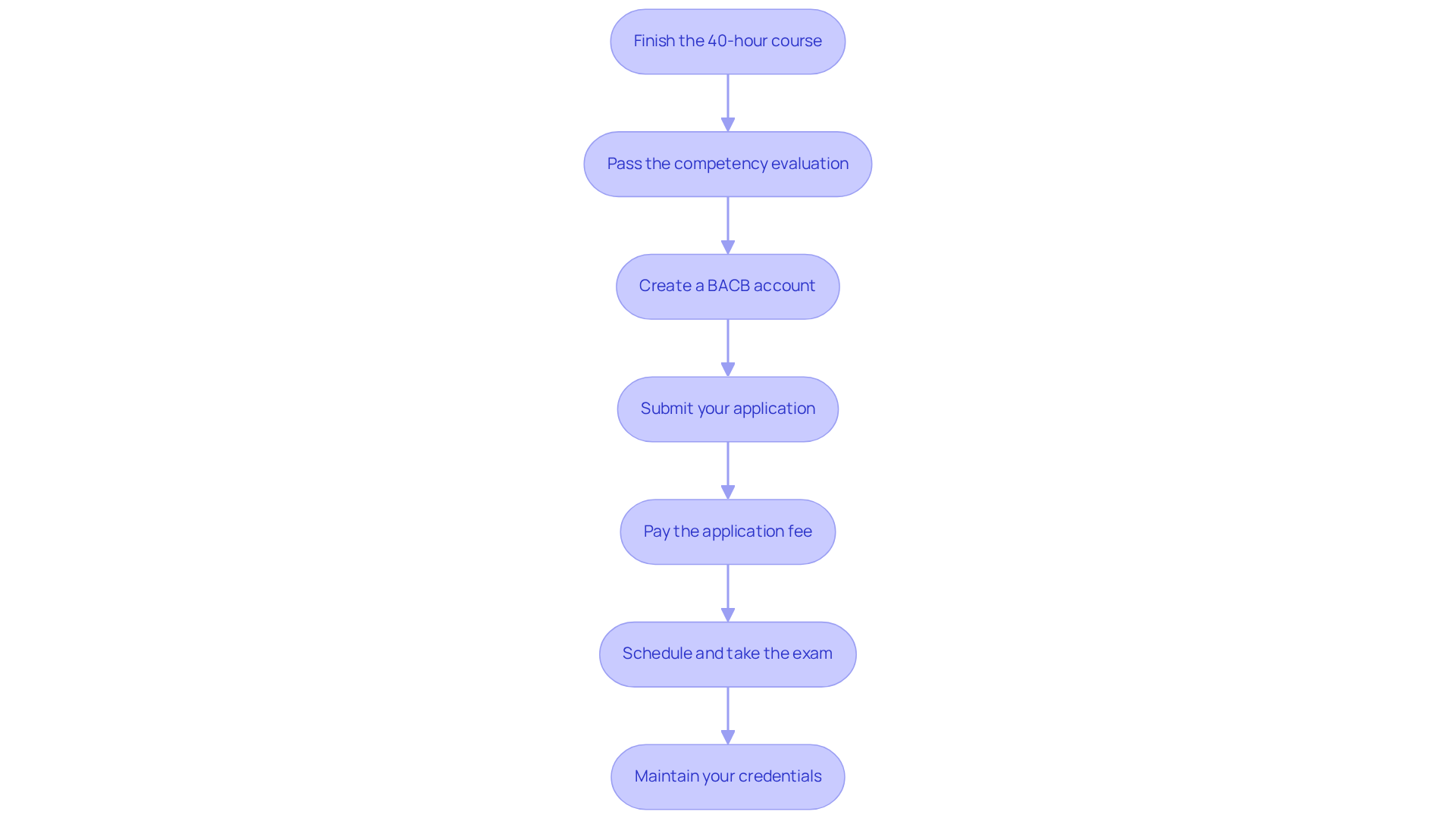September 12, 2025

The article presents a thorough step-by-step guide for obtaining RBT certification in New Jersey, outlining the essential qualifications, application process, and ongoing requirements. This certification is crucial in the field of behavior analysis, as it underscores the rigorous standards established by the BACB. These standards ensure that RBTs are adequately equipped to support clients effectively, thereby enhancing their career prospects and fostering professional growth.
The field of behavior analysis is experiencing a notable increase in demand for qualified professionals, with over 136,000 Registered Behavior Technicians (RBTs) currently practicing across the United States. This credential not only represents a commitment to ethical practices but also unlocks numerous career opportunities for those eager to impact the lives of individuals with autism and other developmental disorders.
However, the path to obtaining RBT certification in New Jersey can be challenging, filled with specific requirements and steps that must be meticulously followed.
What obstacles might aspiring RBTs encounter on this journey, and how can they effectively navigate the process to achieve successful certification?
The Registered Behavior Technician (RBT) credential stands as a crucial qualification in the field of behavior analysis, signifying that an individual has met specific training and competency requirements essential for delivering behavior-analytic services. RBTs operate under the supervision of Board Certified Behavior Analysts (BCBAs) and play an integral role in implementing treatment plans for clients, particularly those with autism and other developmental disorders. As of 2025, approximately 136,847 Registered Behavior Technicians are practicing in the United States, highlighting the increasing demand for qualified professionals in this sector.
For individuals aspiring to build a career in ABA therapy, obtaining RBT certification NJ is vital. This credential not only demonstrates a commitment to professional standards and ethical practices but also opens doors to various . Many RBTs progress to become BCBAs, thereby amplifying their influence in behavior analysis. BCBAs often underscore the significance of RBTs, asserting that they are essential to the success of treatment plans and the overall effectiveness of ABA therapy.
For those dedicated to making a positive impact in the lives of clients, the RBT credential serves as a foundational stepping stone. Are you ready to take the next step in your career? Consider how the RBT certification NJ can enhance your professional journey and contribute to the growing field of behavior analysis.

To qualify for [RBT certification NJ](https://ababuildingblocks.com/rbt-certification), candidates must adhere to the following BACB requirements:
These stringent requirements are designed to ensure that RBTs are not only well-prepared to deliver effective support to clients but also uphold the ethical standards expected in the field, as outlined in the RBT Ethics Code (2.0). The importance of RBT certification NJ is underscored by the fact that certified RBTs often enjoy enhanced career prospects and earning potential, with average wages around $24 per hour.
Moreover, the accreditation process encourages a dedication to continual professional growth, which is essential in a swiftly changing industry. As highlighted by industry leaders, "This commitment to professional development not only preserves your credentials but also enhances the quality of services offered to clients."
Additionally, RBT credentials require annual renewal, emphasizing the ongoing nature of professional growth in this field.

To apply for RBT certification NJ, follow these essential steps:
Success stories abound, with over 150,000 certified RBTs and more than 20,000 individuals achieving their RBT certification NJ in 2023 alone, reflecting the . As one accomplished RBT remarked, 'The path to qualification was difficult yet immensely gratifying, unlocking opportunities for a satisfying career in behavior analysis.

Here are some frequently asked questions about RBT accreditation:
Practical experiences show that numerous candidates consider the certification process attainable, particularly with employer-sponsored development alternatives accessible. Approximately 80% of RBT candidates receive free training through their employers, significantly reducing their overall costs. Additionally, candidates who complete exam preparation courses report a 92% first-time pass rate, highlighting the value of thorough preparation.

Achieving RBT certification in New Jersey is not just a milestone; it is a crucial step for those eager to elevate their careers in behavior analysis. This credential validates an individual's training and competencies while underscoring a commitment to ethical practices and professional standards within the field. With the demand for Registered Behavior Technicians on the rise, obtaining this certification becomes essential for aspiring professionals who aim to make a significant impact in the lives of clients, especially those with autism and developmental disorders.
The certification process involves critical steps, including:
Candidates must complete a 40-hour training program, pass a competency assessment, and maintain their credentials through ongoing education and supervision. Moreover, the financial investment in RBT certification can be alleviated through employer-sponsored training opportunities, making this pathway accessible to many.
Embracing the journey toward RBT certification not only enhances individual career prospects but also aligns with the broader mission of improving behavioral health services. Are you ready to take the first step toward certification? This path can lead to a rewarding career that positively influences the lives of many. The importance of RBT certification is paramount; it is a vital component in the landscape of behavior analysis, fostering a community of skilled professionals dedicated to excellence in service delivery.
What is the Registered Behavior Technician (RBT) credential?
The RBT credential is a crucial qualification in behavior analysis that signifies an individual has met specific training and competency requirements necessary for delivering behavior-analytic services.
Who do RBTs work under?
RBTs operate under the supervision of Board Certified Behavior Analysts (BCBAs).
What role do RBTs play in treatment plans?
RBTs play an integral role in implementing treatment plans for clients, particularly those with autism and other developmental disorders.
How many RBTs are practicing in the United States as of 2025?
As of 2025, approximately 136,847 Registered Behavior Technicians are practicing in the United States.
Why is obtaining RBT certification important for individuals aspiring to work in ABA therapy?
Obtaining RBT certification is vital as it demonstrates a commitment to professional standards and ethical practices, and it opens doors to various career paths in behavior analysis.
What career progression is common for RBTs?
Many RBTs progress to become BCBAs, thereby amplifying their influence in the field of behavior analysis.
How do BCBAs view the role of RBTs?
BCBAs underscore the significance of RBTs, asserting that they are essential to the success of treatment plans and the overall effectiveness of ABA therapy.
What impact does the RBT credential have on a professional's career?
The RBT credential serves as a foundational stepping stone for those dedicated to making a positive impact in the lives of clients and contributes to the growing field of behavior analysis.
Our expert recruitment strategies and AI-driven sourcing ensure that you receive top-notch candidates quickly, without compromising on quality. Whether you’re looking for BCBAs, Clinical Directors, or RBTs, we’ve got you covered.